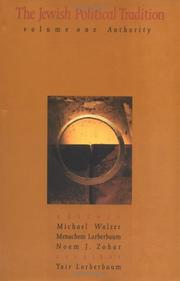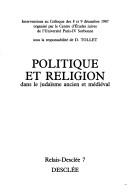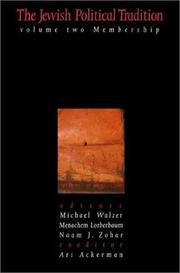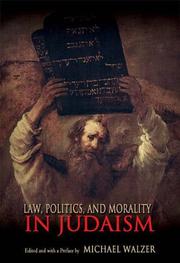| Listing 1 - 10 of 19 | << page >> |
Sort by
|
Book
ISBN: 081738684X 9780817386849 Year: 2012 Publisher: Alabama University of Alabama Press
Abstract | Keywords | Export | Availability | Bookmark
 Loading...
Loading...Choose an application
- Reference Manager
- EndNote
- RefWorks (Direct export to RefWorks)
Jews --- Judaism and state. --- Disabilities, Political --- Emancipation of Jews --- Jewish emancipation --- Political disabilities --- State and Judaism --- State, The --- Emancipation. --- History

ISBN: 9786611729646 1281729647 0300127723 9780300127720 0300102011 9780300102017 0300078226 9780300078220 661172964X 9781281729644 Year: 2000 Publisher: New Haven Yale University Press
Abstract | Keywords | Export | Availability | Bookmark
 Loading...
Loading...Choose an application
- Reference Manager
- EndNote
- RefWorks (Direct export to RefWorks)
This book launches a landmark four-volume collaborative work exploring the political thought of the Jewish people from biblical times to the present. Each volume includes a selection of texts-from the Bible and Talmud, midrashic literature, legal responsa, treatises, and pamphlets-annotated for modern readers and accompanied by new commentaries written by eminent philosophers, lawyers, political theorists, and other scholars working in different fields of Jewish studies. These contributors join the arguments of the texts, agreeing or disagreeing, elaborating, refining, qualifying, and sometimes repudiating the political views of the original authors. The series brings the little-known and unexplored Jewish tradition of political thinking and writing into the light, showing where and how it resonates in the state of Israel, the chief diaspora settlements, and, more broadly, modern political experience. This first volume, Authority, addresses the basic question of who ought to rule the community: What claims to rule have been put forward from the time of the exodus from Egypt to the establishment of the state of Israel? How are such claims disputed and defended? What constitutes legitimate authority? The authors discuss the authority of God, then the claims of kings, priests, prophets, rabbis, lay leaders, gentile rulers (during the years of the exile), and the Israeli state. The volume concludes with several perspectives on the issue of whether a modern state can be both Jewish and democratic. Forthcoming volumes will address the themes of membership, community, and political vision. Among the contributors to this volume: Amy Gutmann Moshe Halbertal David Hartman Moshe Idel Sanford Levinson Susan Neiman Hilary Putnam Joseph Raz Michael Sandel Allan Silver Yael Tamir
Jews --- Judaism and politics. --- Judaism and state. --- Leadership --- State and Judaism --- State, The --- Judaism --- Politics and Judaism --- Political science --- Zionism --- Politics and government. --- Religious aspects --- Judaism. --- Political aspects --- Political and social conditions
Book
ISBN: 1317148843 1317148835 1409466388 9781409466383 9781409466390 1409466396 9781409466376 140946637X 9781315577838 9781317148821 9781317148838 9781138271968 1315577836 Year: 2013 Publisher: Burlington, Vt. : Ashgate Publishing,
Abstract | Keywords | Export | Availability | Bookmark
 Loading...
Loading...Choose an application
- Reference Manager
- EndNote
- RefWorks (Direct export to RefWorks)
Soldiering, which for almost two millennia was almost entirely foreign to Jewish thought and practice, has by virtue of universal conscription become a rite of passage to citizenship in the Jewish state. For practicing orthodox Jews in Israel that change generates dilemmas that are intellectual as well as behavioural, and has necessitated both doctrinal and institutional adaptations. At the same time, the responses thus evoked are forcing Israel's decision-makers to reconsider the traditional role of the Israel Defence Force (IDF) as their country's most evocative symbol of national unity.
Judaism and state. --- Civil-military relations --- Military law (Jewish law) --- War (Jewish law) --- War --- War and Judaism --- Jewish law --- State and Judaism --- State, The --- Religious aspects --- Judaism. --- Judaism --- Israel --- Armed Forces.
Book
ISBN: 1618110721 9781618110725 9781936235629 1936235625 Year: 2013 Publisher: Boston, MA
Abstract | Keywords | Export | Availability | Bookmark
 Loading...
Loading...Choose an application
- Reference Manager
- EndNote
- RefWorks (Direct export to RefWorks)
Do Not Provoke Providence: Orthodoxy in the Grip of Nationalism deals with the whole complex of relations between the Land of Israel, the Jewish Torah, and the People of Israel from the Pre-Zionist Period until the establishment of the State of Israel. The book examines the dynamics of those relations through the modernization of Jewish society, and the problem of Jewish Identity vis-a-vis modernity. The discussion follows historical events in both philosophy and everyday life. It explores the anti-Zionist sphere and also discusses the attitudes toward the conflict of religion and nationalism in the world of Religious Zionism. The dispute between advocates of a religious concept of the community and proponents of a secular nation revolved primarily around perceptions of the ideal relationship between the religious and national entities. One group sought to make religion a tool of the nation; the other sought to make the nation a tool of religion.
Orthodox Judaism. --- Zionism and Judaism. --- Judaism and state. --- Religious Zionism --- Judaism --- Zionism --- State and Judaism --- State, The --- Judaism and Zionism --- Jewish sects --- Ex-Orthodox Jews --- Philosophy. --- Palestine --- In Judaism.
Book
ISBN: 1108667945 1316584623 1107150825 110866802X Year: 2019 Publisher: Cambridge : Cambridge University Press,
Abstract | Keywords | Export | Availability | Bookmark
 Loading...
Loading...Choose an application
- Reference Manager
- EndNote
- RefWorks (Direct export to RefWorks)
State and Religion in Israel begins with a philosophical analysis of the two main questions regarding the role of religion in liberal states: should such states institute a 'Wall of Separation' between state and religion? Should they offer religious practices and religious communities special protection? Gideon Sapir and Daniel Statman argue that liberalism in not committed to Separation, but is committed to granting religion a unique protection, albeit a narrower one than often assumed. They then use Israel as a case study for their conclusions. Although Israel is defined as a Jewish state, its Jewish identity need not be interpreted religiously, requiring that it subjects itself to the dictates of Jewish law (Halakha). The authors test this view by critically examining important topics relevant to state and religion in Israel: marriage and divorce, the drafting of yeshiva students into the army, the character of the Sabbath and more.
Judaism and state --- Religion and state --- Democracy --- Jewish philosophy --- Jews --- Philosophy, Jewish --- Philosophy, Israeli --- Judaism and democracy --- State and religion --- State, The --- State and Judaism --- Philosophy. --- Religious aspects --- Judaism. --- History --- Philosophy --- Israel --- Politics and government.

ISBN: 2718904127 9782718904122 Year: 1989 Volume: 7 Publisher: Paris Desclée
Abstract | Keywords | Export | Availability | Bookmark
 Loading...
Loading...Choose an application
- Reference Manager
- EndNote
- RefWorks (Direct export to RefWorks)
Jews --- Judaism and state --- Politics and government --- Congresses --- 296*811 --- 296 <063> --- -Judaism and state --- -State and Judaism --- State, The --- Hebrews --- Israelites --- Jewish people --- Jewry --- Judaic people --- Judaists --- Ethnology --- Religious adherents --- Semites --- Judaism --- Antisemitisme--in oudheid en middeleeuwen --- Judaïsme. Jodendom--Congressen --- -Congresses --- -Antisemitisme--in oudheid en middeleeuwen --- 296*811 Antisemitisme--in oudheid en middeleeuwen --- State and Judaism --- Politics and government&delete& --- Jews - Politics and government - Congresses --- Judaism and state - Congresses

ISBN: 0300094280 9780300102017 9780300115734 0300078226 Year: 2000 Publisher: New Haven Yale university
Abstract | Keywords | Export | Availability | Bookmark
 Loading...
Loading...Choose an application
- Reference Manager
- EndNote
- RefWorks (Direct export to RefWorks)
-Judaism and politics --- Judaism and state --- -Ability --- State and Judaism --- Politics and Judaism --- -State and Judaism --- Jodendom en politiek --- Jodendom en staat --- Judaism and politics --- Judaïsme et Etat --- Judaïsme et politique --- Judaism and politics. --- Judaism and state. --- Judaïsme et politique --- Judaisme et Etat --- Jews --- Leadership --- Juifs --- Politics and government. --- Religious aspects --- Judaism. --- Politique et gouvernement --- State, The --- Judaism --- Political science --- Ability --- Command of troops --- Followership --- Hebrews --- Israelites --- Jewish people --- Jewry --- Judaic people --- Judaists --- Ethnology --- Religious adherents --- Semites --- Politics and government --- -Judaism --- Political aspects --- Sociology of minorities --- Political philosophy. Social philosophy --- Jewish religion --- -Politics and government
Book
ISBN: 9789004289888 9004289887 9789004292222 9004292225 Year: 2015 Volume: 169 Publisher: Leiden Brill
Abstract | Keywords | Export | Availability | Bookmark
 Loading...
Loading...Choose an application
- Reference Manager
- EndNote
- RefWorks (Direct export to RefWorks)
Ancient Near Eastern empires, including Assyria, Babylon and Persia, frequently permitted local rulers to remain in power. The roles of the indigenous elites reflected in the Nehemiah Memoir can be compared to those encountered elsewhere. Nehemiah was an imperial appointee, likely of a military/administrative background, whose mission was to establish a birta in Jerusalem, thereby limiting the power of local elites. As a loyal servant of Persia, Nehemiah brought to his mission a certain amount of ethnic/cultic colouring seen in certain aspects of his activities in Jerusalem, in particular in his use of Mosaic authority (but not of specific Mosaic laws). Nehemiah appealed to ancient Jerusalemite traditions in order to eliminate opposition to him from powerful local elite networks.
Judaism and state --- Judaism --- 222.7 --- Hellenistic Judaism --- Judaism, Hellenistic --- State and Judaism --- State, The --- History --- Kronieken. Ezra. Nehemia --- Nehemiah --- Nehemias --- Neḥemyah --- נחמיה --- Bible. --- Esdras (Book 2, Vulgate) --- Nehemiah (Book of the Old Testament) --- Neḥemyah (Book of the Old Testament) --- Criticism, interpretation, etc. --- Yehud (Persian province) --- Kings and rulers.
Book
ISBN: 9004086307 9789004086302 Year: 1988 Publisher: Leiden Brill
Abstract | Keywords | Export | Availability | Bookmark
 Loading...
Loading...Choose an application
- Reference Manager
- EndNote
- RefWorks (Direct export to RefWorks)
Judaism --- Judaism and state --- Theocracy --- History of doctrines --- 296*52 --- -Judaism and state --- -Theocracy --- #GOSA:XV.Jod.M --- God --- State and Judaism --- State, The --- Jews --- Religions --- Semites --- Joodse ethiek: Halacha; Minhag (gewoonten); Tora --- Religion --- 296*52 Joodse ethiek: Halacha; Minhag (gewoonten); Tora --- Judaism - Israel --- Judaism and state - History of doctrines

ISBN: 0691125082 0691125074 9780691125077 9780691125084 9786612129476 1282129473 1400827205 9781400827206 9781282129474 6612129476 Year: 2006 Publisher: Princeton (N.J.) Princeton university press
Abstract | Keywords | Export | Availability | Bookmark
 Loading...
Loading...Choose an application
- Reference Manager
- EndNote
- RefWorks (Direct export to RefWorks)
Jewish legal and political thought developed in conditions of exile, where Jews had neither a state of their own nor citizenship in any other. What use, then, can this body of thought be today to Jews living in Israel or as emancipated citizens in secular democratic states? Can a culture of exile be adapted to help Jews find ways of being at home politically today? These questions are central in Law, Politics, and Morality in Judaism, a collection of essays by contemporary political theorists, philosophers, and lawyers. How does Jewish law accommodate--or fail to accommodate--the practice of democratic citizenship? What range of religious toleration and pluralism is compatible with traditional Judaism? What forms of coexistence between Jews and non-Jews are required by shared citizenship? How should Jews operating within halakha (Jewish law) and Jewish history judge the use of force by modern states? The authors assembled here by prominent political theorist Michael Walzer come from different points on the religious-secular spectrum, and they differ greatly in their answers to such questions. But they all enact the relationship at issue since their answers, while based on critical Jewish texts, also reflect their commitments as democratic citizens. The contributors are Michael Walzer, David Biale, the late Robert M. Cover, Menachem Fisch, Geoffrey B. Levey, David Novak, Aviezer Ravitzky, Adam B. Seligman, Suzanne Last Stone, and Noam J. Zohar.
Jewish law --- Judaism and state. --- Law --- Public law (Jewish law) --- Moral and ethical aspects. --- Jewish influences. --- Public law (Jewish law). --- Jewish influences --- State and Judaism --- Biblical law --- Civil law (Jewish law) --- Halacha --- Halakha --- Halakhah --- Hebrew law --- Jews --- Law, Hebrew --- Law, Jewish --- Law, Mosaic --- Law in the Bible --- Mosaic law --- Torah law --- State, The --- Law, Semitic --- Commandments (Judaism) --- Judaism and state --- Moral and ethical aspects
| Listing 1 - 10 of 19 | << page >> |
Sort by
|

 Search
Search Feedback
Feedback About UniCat
About UniCat  Help
Help News
News